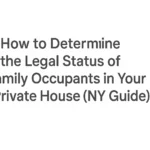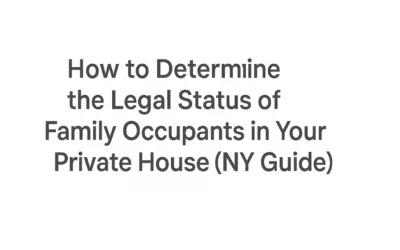A third of Americans rent their homes, and since New York has some of the highest percentages of renters, standards of renters’ rights have been occasionally overlooked. What happens then? Should these rights be disregarded or addressed? The answer may seem simple, and at the same time it can seem hopeless to uphold all of the ideal guidelines placed for all New York landlords. This can be combated by being aware of your rights as a renter. Knowing the rights of New York renters and in the United States is not something that you have to do alone. With a briefing of your rights and of the opportunities for New York renters, the standard will be upheld for both renters and landlords. The opportunities that are being offered are proven to address the legal matters that are connected to all concerns that renters in New York often face.
Renter Rights in New York allows renters to know many critical things that can otherwise be overlooked, including the limitations regarding deposits. Additionally, being aware of your renter rights allows you to know why you should be aware of the details, including the amount of days that pass after agreements are made, when eviction notices go into effect, when the renters can repay to avoid eviction. Whether you are a new renter or you have been renting for several years, it is significant to know the cost that landlords may be required to pay if they do not uphold the rights of renters as well. All of this can become overwhelming to manage, as there are many things in our daily lives that we already have to keep track of and manage.
Many renters have found that after they have become aware of their rights and want to keep their landlords accountable, that they want a law firm to work alongside them. First, you will want to see a summary of the rights that you have as a renter and will want to see some examples of how useful this information can be, both as a renter now or in the future.
Important Rights to Know as a Renter in New York
Both the beginning and end of a rental agreement can pose opportunities for renters and their landlords to experience conflict, though there are the General Rights and the Rights of New York renters that we will be able to look at as we gather a legal understanding of the things that landlords must remain responsible for.
Some of the major General rights for renters in the United States include:
- Eviction Notice Requirements
- Security deposit price ceilings
- Limitation of late fees
- Tenant response to landlord filing
- Breach of lease terms by the landlord and recourse by the tenant
- Non-retaliation regulations
- Penalties of self-help (which refers to illegal “lock-out”)
- Right to Legal Representative
These general rights have been adjusted per state and for major cities as well. Since living situations and costs can greatly vary. To get an idea of what this looks like, we can view some examples of the items that renters in New York City should be aware of. First, there are the yearly increases in rent as determined by the statutorily-created Rent Guidelines Board. This board also determines the enforcement of rent regulations against landlords. Since the majority of landlords who file a formal eviction are represented in court, then it leaves renters at a disadvantage, far too often. This is a result of not being aware of your rights, and not knowing who to turn to, if they are violated.
The common terms that renters’ fear becoming a reality, are important to be able to define and understand. When considering “eviction”, it is considered as the involuntary displacement from one’s housing, which can result from a variety of causes. This becomes formal once it is filed through a court system. Usually, it only occurs if the decision cannot be handled between the renter and the landlord, and if there is a valid reason that eviction will be necessary. Some examples involve many cases of not paying rent, not abiding by the given standards, allowing people to stay who are not on the lease, and interfering with the rights of other tenants.
The next major term and step in this process would involve an eviction notice, which informs the renter of the violation and the consequence. When the notice is given, there are usually some options that the renter has in order to keep from having to leave the property. Some examples include payment or an agreement benign made between the landlord and renter. Separately, there is also the option that is called “notice to quit”, which only results from a lease violation becoming ineligible of being cured, showing that there are no options being given other than the request to leave the property. These basics are regarding how the end of an agreement can be handled, and there are so many details that offer answers to the individual situations that you may face.
Trust the Ottley Law Firm with Your Rights as a Renter!
Roland Ottley
Ultimately, the laws vary at the city, state, and federal level, leaving a need for proper representation for renters in New York, so that the property can be delegated in a just way. Though as a renter who has access to a variety of levels of representation, you may want to consider how you want your case to be handled. It is quite well-known that being in a legal case will be time-consuming and taxing on anyone. Therefore, it will be crucial to take hold of the opportunity to work alongside a law firm that is already well-acquainted with your rights, and has proven to bring successful conclusions for their clients.
Voted as the best litigation attorney in Brooklyn in 2022, TOLF (The Ottley Law Firm, P.C.) communicates thoroughly with their clients about their rights, and is able to guide the case with absolute professionalism. You will want to be with a law firm that has been providing elite legal services for over 15 years, and even as the rights for renters in New York alte. For example, in response to the COVID 19 pandemic, there have been additional guidelines placed for renters and landlords that is considered law. Having an experienced and specialized law firm will be especially important for you to be able to have a comfortable living situation, and to maintain your respective rights.









0 Comments